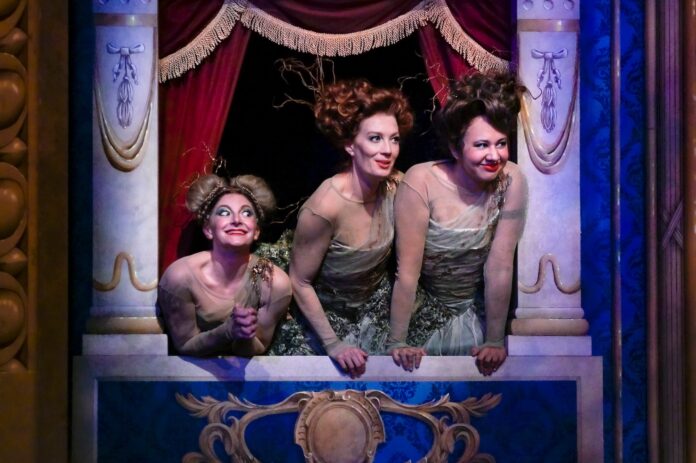This is Drama Masks, a Bay Area performing arts column—full of mad ramblings, Oxford commas, and “theatre” spelled with an “r-e”—from a born San Franciscan and longtime theatre veteran wearing an N95 mask. Prepare to hear about venue safety (or lack thereof) alongside dramatic substance (likewise).
I swear, the hardest part about starting a new column is choosing a name for it. My last regular column was a decade ago (for Bay Area theatre website that I’m surprised hasn’t shut down), and I named it “In For a Penny” out of frustration that I could think of something better.
For this one, I wanted something intrinsically theatrical, distinctively Bay Area, and easy-to-remember. “Bay Area Theatre” was too generic. “Performance BART” or “Commedia dell’BARTe” I liked, but didn’t capture the all-encompassing scope I’m going for. When you refuse to use generative AI, it’s easy to get lost in your own head.
With the Bay Area connection a given (48 Hills ‘n all), I settled on “Drama Mask.” Generic, yes, but perfectly summing up my thoughts as a live theatre patron during a very-much-not-over pandemic. This column will not only comment on staged work, but also let fellow safety-conscious patrons (particularly, those disabled and/or immunocompromised) know the risks of venturing out amongst the unwashed—nay, unmasked—masses. In both respects, I hope to be a reliable resource as I kvetch about black box shows and Broadway tours in the same breath.
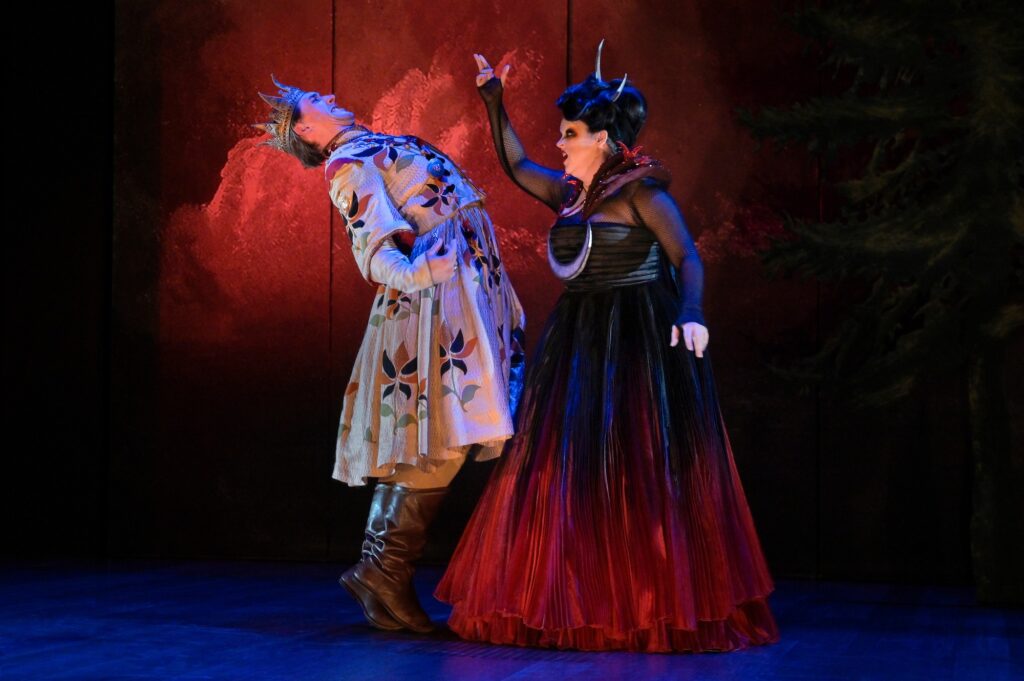
THE MATCHBOX MAGIC FLUTE AT BERKELEY REP
Perhaps Tom Stoppard’s creative zenith was 15-Minute Hamlet. Before he started whining about “cancel culture,” the unabashed “bardolator” successfully condensed the Stratford boy’s lengthiest text down to a pocket-sized snack that hits all the major plot points whilst excising most of the lines. Sometimes even the most complex story can be summed up in an elevator pitch.
Mozart’s The Magic Flute was never a complex opera, but credit to Mary Zimmerman and her adaptation The Matchbox Magic Flute (West Coast premiere through December 8 at Berkeley Rep) for simplifying it even further. She’s trimmed the fat off the beloved children’s tale about royals, dragons, and witches. In fact, she seems determined to reckon with the opera’s more problematic story points.
For instance, Monostatos (Russell Mernagh) is no longer a Moor whipped by Sarastro (Fernando Watts, a Black man) but some humanoid reptilian creature. Zimmerman’s version still has the “matriarchy = evil” subtext, but she tries to counter it with a new Sarastro direct address to the audience and the inclusion of the Queen of the Night (showstopper Emily Rohm) and her three Ladies (Lauren Molina, Monica West, Tina Muñoz-Pandya) in the happy ending.
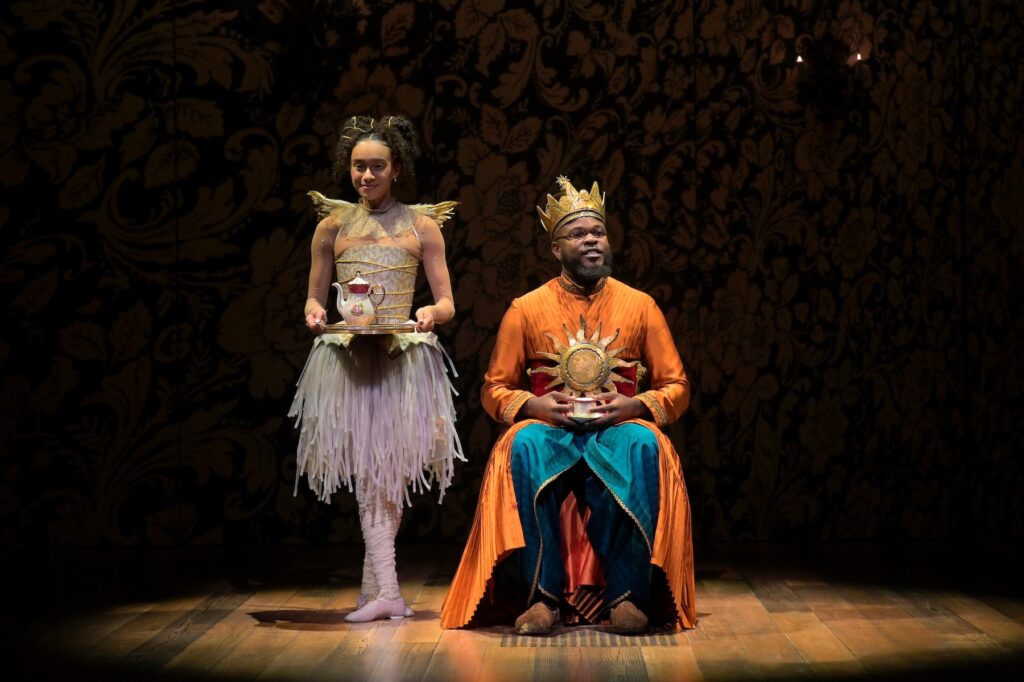
The real star of the show is set designer Todd Rosenthal’s stage-within-a-stage, with pint-sized opera boxes along the border, and set pieces resembling story book pop-ups. The “orchestra” is five musicians dressed as dervishes in a de facto pit. It’s a tongue-in-cheek attempt to bring the opera house to the non-opera crowd. It lets everyone in on the joke, even when one or two performances are off (Shawn Pfautsch’s Papageno is a bit too scenery-chewing, even for the tone).
The performance I saw wasn’t a masked-required show (typically, Sundays and Tuesdays, though not always for an entire run) and barely anyone besides me masked up. Yet, I was pleased to see the Rep’s HVAC system once again do its magic. Over the two acts, CO² readings on my Aranet4 peaked at a mere 702ppm, dropping down to 650ppm by the end.
It’s hard to say whether the Berkeley Rep crowd will buy subscriptions to SF Opera after one irreverent show, but as an unabashed opera-lover and patron, I can say that it was nice wink-and-nod that can be seen as a “gateway opera” just as much as a light fairy tale. Much like the classic it adapts.
THE MATCHBOX MAGIC FLUTE’s West Coast premiere runs through December 8 at the Berkeley Rep. Tickets and further info here.
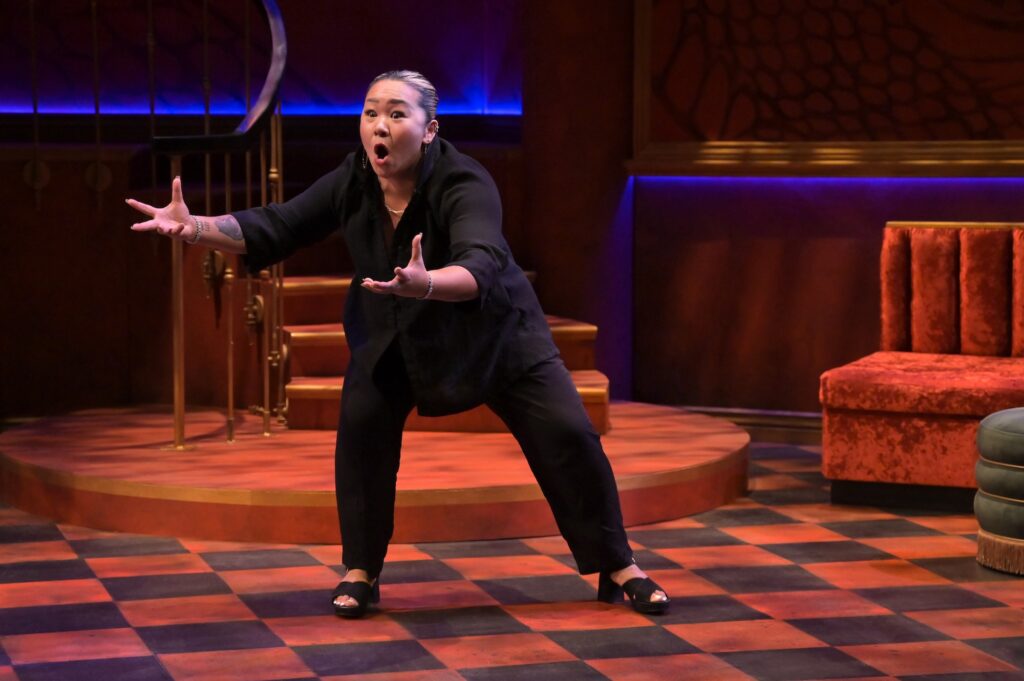
DRAGON LADY AT CENTER REP
Who gets to tell our life story after we’re gone? Is the story we tell in life any less valid because it makes us the main character? When, if at all, should a fellow “character” be allowed to pick apart the plot holes in someone’s well-worn mythology?
Sara Porkalob’s been asking herself that for years. She has a trilogy of solo plays dedicated to simultaneously venerating and scrutinizing the lives of her grandmother, her mother, and herself. With the grandmother having recently passed away, it’s understandable why Sara chose to revisit her often-conflicting story with a revival of her first trilogy piece, Dragon Lady (through November 24 at the Lescher Center for the Arts, Walnut Creek). Learning the stories of our families—particularly, our parents—is learning the stories of ourselves, after all.
On Randy Wong-Westbrooke’s “‘60s Asian lounge” set (with scaled dragon tale border), Porkalob takes us on the wild journey of a life story spun by her vivacious then-60-year-old grandmother Maria before the start of her birthday party. It’s an exciting yarn beginning in the Philippines, full of murder, gangsters, sex work, singing, and the dramatic rescue of her daughter (also named Maria) that wouldn’t be out of place in an action flick.
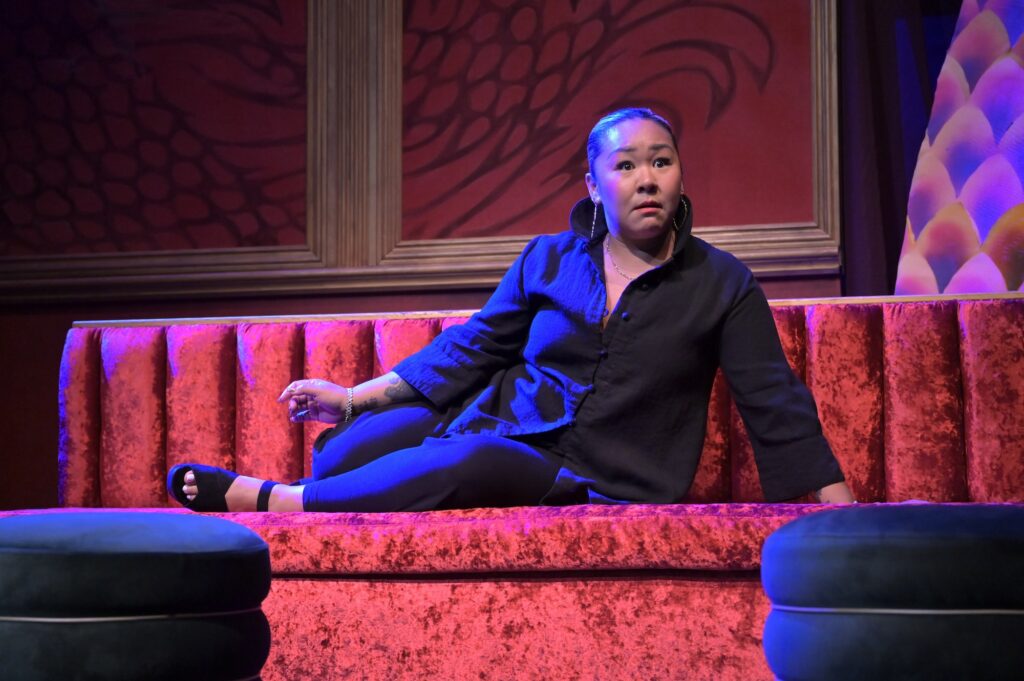
That’s the first act. But the younger Maria, Sara’s mother, comes not to praise the elder Maria, but to bury her. The younger Maria’s tale is one of having to parent her younger siblings because their mother is never around. What’s more, she casts doubt on every tall tale elder Maria spins for Sara.
But does that make the elder’s tale any less valid? Sure, not every detail holds up, but does that make it wrong that this is the tale she tells her grand-daughter; the story she wants to be remembered by on her 60th birthday? She tells Sara that she has no worries about death being around the corner, but she wants her story to be told in detail. That Sara so distinctively creates each individual character sure doesn’t hurt.
Nor did it hurt that the Lescher seems to have top-notch HVAC, which is a relief when unmasked mouth-breathers talk across you for long stretches. (I do love my Flo Mask and safety glasses.) Said HVAC meant that the CO² readings of my Aranet4 only peaked at about 1,010ppm during the two-act show.
By coincidence, opening night of the show fell on the end of Día de los Muertos. How appropriate that this Pinay-American show revels in telling one’s life story can be told long after they’re gone. If that’s the goal in and of itself, then the versatile and energetic Porkalob succeeds admirably.
DRAGON LADY runs through November 24 at the Lescher Arts Center, Walnut Creek. Tickets and further info here.
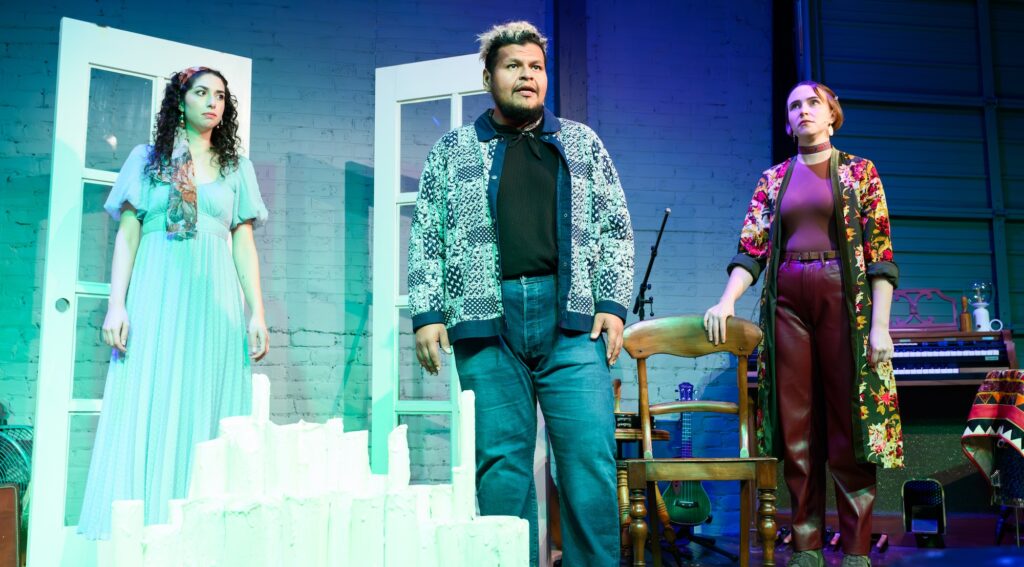
GHOST QUARTET AT OAKLAND THEATER PROJECT
Don’t ask about the story to Ghost Quartet (through December 8 at FLAX, Oakaland, and ODC, SF). Seriously, trying to follow Dave Malloy’s tale of supernatural children and spirits from beyond is folly: Performers change character on a dime; plot details are spit out en masse; and what elements you do pick up—time travel, reincarnation, curses, and sex—might be cringe-inducing.
This isn’t a play, it’s a concept album. In fact, every scene is introduced by the show’s unofficial narrator (Michael Perez) naming them as one would tracks on a vinyl sleeve. (“Side 2, track two: ‘Family meeting.’”) Mind you, great musicals like Tommy, Jesus Christ Superstar, and Aida started as concept albums, but a playwright’s sense of clarity is needed to declutter it all. An album is for listening without having to follow closely.
Granted, the Kilbanes successfully pulled off the “live concept album” with the excellent Weightless, but Malloy—through director William Hodgson—simply has half-a-dozen performers gather on boho stage going on and on without any apparent care for whether the audience follows. Which most didn’t: Despite some indisputably-talented performers, my attention was constantly pulled away from the stage to see more than half the patrons either nodding off or fighting to keep their eyes open.
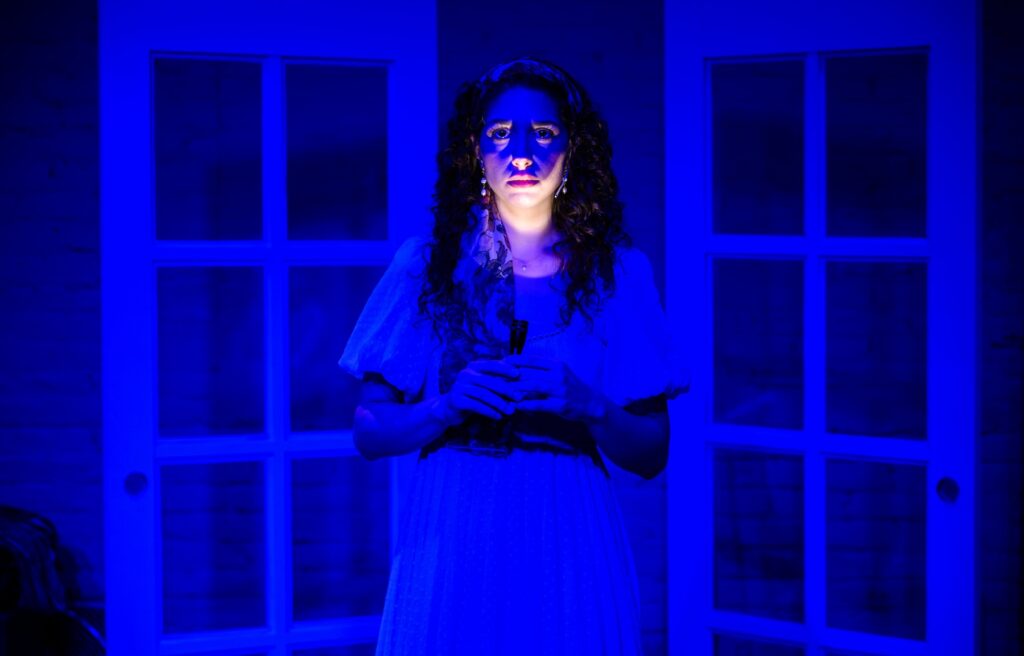
One thing I was certainly glad to see was that nearly half the opening night (Sunday) crowd were masked, despite the mask-required shows being limited to Fridays. Still, the lack of circulation in the FLAX building saw CO² readings on my Aranet4 jump to 2,313ppm by the end of the 90-minute show.
We were told that this was “OTP’s first musical,” which was surprising to hear. As it stands, their first features talented performers working a concept album in desperate need of distillation. Perhaps a further-workshopped version would iron out the shows many, many wrinkles (the world premiere was in New York), but this version makes for an incredibly rough sit-through.
GHOST QUARTET runs through November 24th at FLAX art & design, Oakland, before moving to its supplementary run through December 8 ODC Dance, SF. Tickets and further info here.

